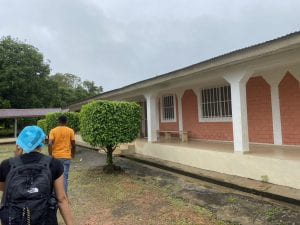Day 2:
The Ukweli Team spent the day visiting peripheral health units (PHUs) to interview PHU staff directly. Noah went to Makama Community Health Post and interviewed Sister Mariama, the Nurse in Charge (NIC) at Makama CHP. The questions asked during the interview focused on obtaining firsthand accounts of the challenges related to UTIs and preeclampsia. The discussions sought to tease apart any potential difficulties that can be addressed in terms of the distribution of Ukweli test strips– although the feedback given was overwhelmingly positive, the insights offered by PHU staff appeared to be relatively uniform from PHU to PHU. For example, each PHU only buys one to two boxes of Ukweli test strips at a time because of the extreme lack of financial resources.
After visiting Makama CHP, Noah met with Grace at World Hope International’s Sierra Leone Field Office– the two traveled to Stocco Dots Center for another interview of the clinic’s doctor, Edwin. The answers were relatively similar to the answers obtained from Sister Mariama, but we learned that most PHUs have one day of the week dedicated to antenatal care (i.e., antenatal day). As a result, Ukweli screenings are only conducted one day out of the week at most PHUs.
Afterwards, Grace & Noah walked with the Ukweli Distribution Manager, Hassan, to view the Bombali District Medical Officer’s building. Hassan brought to our attention that the adjacent PHU, Primary Health Clinic, was hesitant to participate as an Ukweli-equipped PHU due to concerns related to payment for a service that is supposed to be free of charge. However, the team patiently discussed the purpose of the cost recovery model; that is, in order for the test strips to reliably be available at all PHUs, the cost must be recovered for the purchase of more test strips. In particular, the idea of the test strips is to make screening accessible to all without pregnant women having the burden of traveling long distances to a clinic with the ability to conduct further screening.
After further discussion, the Nurse in Charge at Primary Health Clinic appeared more receptive to participating as an Ukweli PHU, but she would like re-verification of our project’s permission to operate within the district– this is because a new District Medical Officer (DMO) was recently appointed for Bombali District, and PHUs are required to strictly adhere to the wishes of their respective DMO. Therefore, the team is currently attempting to arrange a meeting with the Bombali DMO to alleviate any concerns that Primary Health Clinic and other PHUs may have going forward.
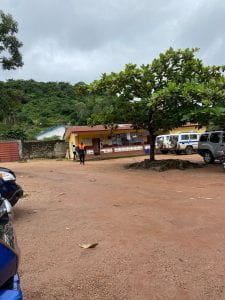
This is the Primary Health Clinic the team visited.
In the afternoon, Grace went to Gladys Koroma Memorial Hospital and met with the nurse who oversaw outpatient care and antenatal care, Fatimah. Grace interviewed her and obtained essential information about the difficulties within a hospital. Fatimah expressed that pregnant women often do not go to get help given they either do not want to pay or they are used to having children and getting taken care of at home so, why should they start now? She also suggested that we should maybe utilize WhatsApp as a way to receive data from PHUs in regards to the results of the test strips. Grace also learned that some private health units do community engagement to try to convince women to come into the units and get tested and treated. This was very beneficial to learn about.
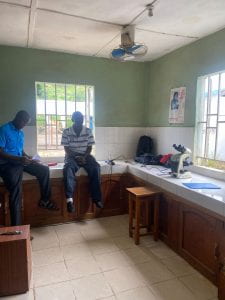
One of the lab technicians at Stocco Dots Center and the lab where he reads the Ukweli Test Strips result
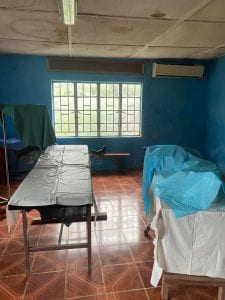
At Gladys Koroma Memorial Hospital; this is the birthing room.
Samara and Matt visited the Magbenteh Community Hospital in Makeni. They were introduced to the Human Resources officer, the hospital manager, and other staff, all who were very friendly and hospitable . Afterwards, the staff then showed them the room in which the cervical screening and treatment occurs. The staff described the full screening and consultation process and walked them through how the patients are treated for cervical cancer if they screened positive. The staff said many women are very open to the treatment if they screen positive, but some have to ask their husbands for permission. This has not been a huge barrier to the program; in fact, they reported that when men are counseled with the women, they are very willing to give their permission as head of the household for the wife to be screened.
Minuet demonstrated the thermal ablation instrument. The rod heats up to 100 degrees Celsius in five second and applies to the lesions on the cervix for 40 seconds to ablate the cancerous tissue. The procedure is virtually painless and no local anesthetic is applied.
Samara shadowed Minuet while screening a patient. Samara observed the consolation and screening process. The patient was nervous at first but Minuet was kind and comforting during the entire process. The vinegar was applied to the cervix and the nurse waiting one minute before she examined the cervix. After her exam, the patient left and Matt and Samara were taken back to the World Hope office to continue revising the IRB informed consent document.
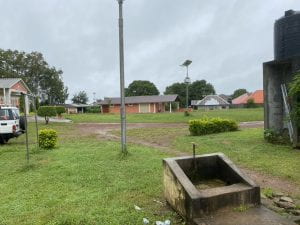
Magbenteh Community Hospital
